| Written by Gabrielle J. Davis, MSHS, MSMHC, LPC, NCC
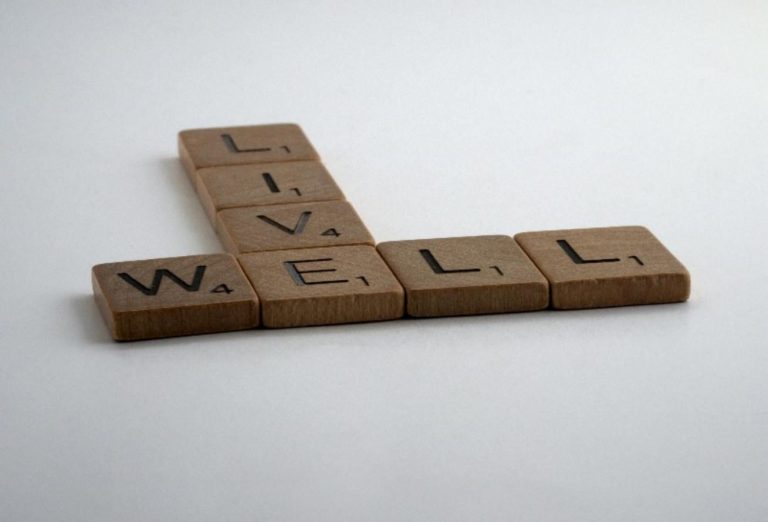
Our lives are driven by our daily routines that can consist of an array of plans, goals, deadlines, and interactions whether it’s with family, friends, co-workers, or people in the community. Within all of that we try to balance all our various activities, priorities, life roles, and other demands that are placed upon us or that we put on ourselves in our different life areas. Then comes those unanticipated stressful moments or unexpected challenges that can induce angst.
Does this sound stressful to you? Well of course, it does!
Stress is a natural part of life and in healthy amounts can motivate us to action. As such, it is important that we have ongoing internal and external awareness that consists of being mindful, accountable, and intentional so that we can manage stress and still maintain something called WELLNESS!
What Is Wellness and Why Is It a Big Deal?
The Global Wellness Institute defines wellness as “the active pursuit of activities, choices and lifestyles that lead to a state of holistic health.” This definition contains two significant factors:
1) Wellness is not a one-time or fixed state or place in time, rather it is an ongoing process that we actively seek to maximize our overall health and sense of happiness; and,
2) Wellness is also holistic and multidimensional – that is, it is not influenced solely by one’s physical health as there are a total of eight health dimensions that work interdependently.
So, what’s the big deal, you ask? According to the World Health Organization (WHO), health is defined as “…a state of complete physical, mental and social well-being and not merely the absence of disease or infirmity.” WHO more specifically defines mental health as “a state of well-being in which an individual realizes his or her own abilities, can cope with the normal stresses of life, can work productively and is able to make a contribution to his or her community.”
We all should strive to pursue wellness that empowers us to experience happiness regardless of our individual, cultural, family, age, gender, employment, or socioeconomic status.

To better assess your current wellness, let’s take a moment to explore the eight dimensions of wellness as posited by the Substance Abuse and Mental Health Services Administration (SAMHSA). Here you will see which of your life areas could use more attention, improvement, or the changes you desire!
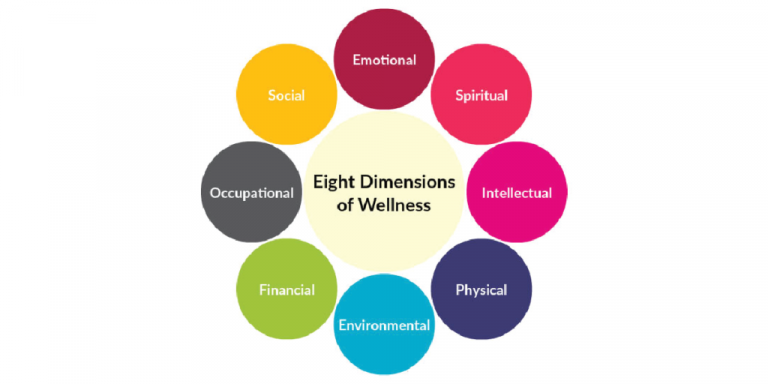
- Emotional: Be in tune with how you’re feeling. Allow yourself to have different emotions that can occur simultaneously as well as conflict – commonly called mixed emotions. It’s important to recognize and talk about your feelings because it’s also a healthy way of coping. Your feelings do matter! Ways to express them if you don’t want to talk right away include journaling, writing a story, drawing, or sketching, painting, sculpting, even singing or dancing your feelings out. Whichever way you choose, don’t bottle them up!

Photo by Tengyart on Unsplash.com - Spiritual: We are continuously growing and evolving in our daily lives. Personal exploration and self-discovery are a natural part of our life’s journey toward purpose, meaning and fulfillment. As part of that process consider participating in guided meditation, yoga, pilates, volunteering, attending religious or community events, reading or learning about something new that can be equally gratifying and uplifting for the mind, body, and spirit.
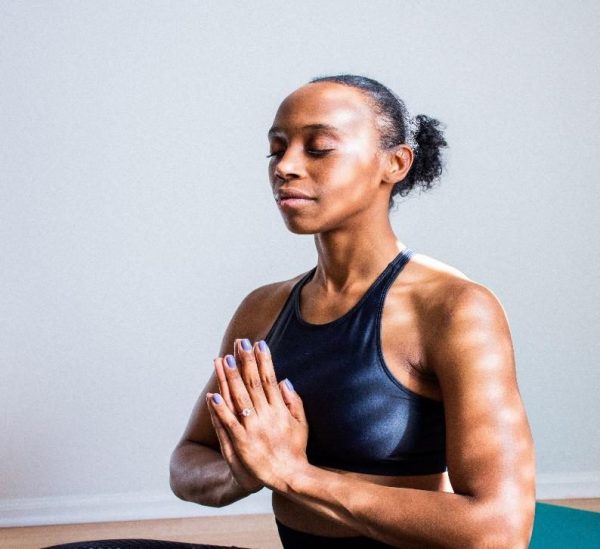
Photo by Madison Lavern on Unsplash.com - Intellectual: Mental stimulation is vital to maintain healthy cognitive functioning that allows us to learn, increase our knowledge and expand our skills, as well as be creative and innovative to try new things. It’s important that we exercise our mind to keep it in shape just like our bodies. Try reading books or magazines, doing puzzles, writing, playing sports, engaging in stimulating conversations, problem-solving, playing board games, creating ‘to do lists,’ or organizing are just a few examples of how to give your mind a good workout.

Photo by Andrey Metelev on Unsplash.com - Physical: As the saying goes – be good to your body and it will be good to you. Attend well-visits with your healthcare provider, get recommended health screenings and vaccinations, take medications as prescribed, drink plenty of water to stay hydrated, go for walks or ride a bike, and follow a healthy sleep regime that prepares you to have more restful sleep. Lastly, eat a balanced diet using MyPlate guidelines through the U.S. Department of Agriculture. Here are some quick and easy recipes to help make sure you’re including all 5 food groups.
- Environmental: Our physical space and immediate surroundings can impact our moods and energy levels. An area that is clean, organized, and aesthetically pleasing generates clearer thoughts, creativity, and a sense of calm and peace. We work to keep the Earth clean by recycling and picking up litter, now let’s be sure to do the same in our own space to stimulate a healthier and happier personal environment.
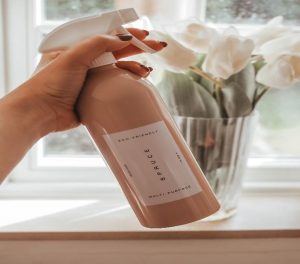
Photo by Spruce Refillable Cleaning on Unsplash.com - Financial: Take a moment to reflect if any changes or improvements are needed in this area. Think about how satisfied you are with managing your money. Investigate where you might be spending too much or saving too little. Consider establishing a budget to designate a certain amount of money for different expenses. It’s also a great way to increase fiscal awareness of your spending and saving habits as well as setting financial goals. Kids can also learn financial responsibility and the value of money to reach specific goals. There are different savings apps such as Greenlight that can encourage kids and teens to create good spending and savings habits.
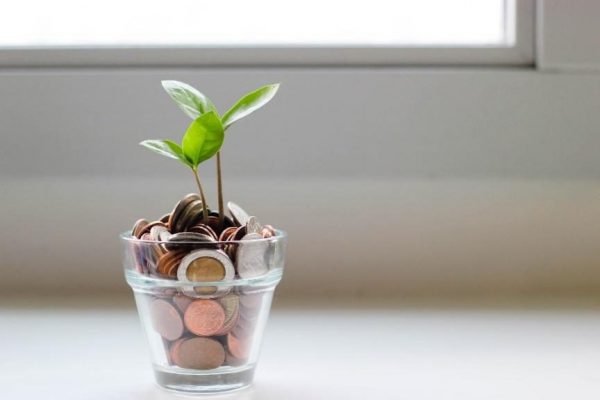
Photo by Michelle Henderson on Unsplash.com - Occupational/Vocational: It’s not a bad idea every so often to check-in with yourself about your job satisfaction and professional growth. It’s okay to re-assess your current job, career, training, or academic pursuits to see if anything needs changing or improving. Perhaps there is a need to hire more staff, or apply for a higher-level position, or maybe even make a career change. Whatever it might be, challenge yourself to explore it.

Photo by Magnet.me on Unsplash.com - Social: Are you connecting with others – family, friends, co-workers, community members, even pets? Social connections are essential to build and strengthen support systems, create a sense of belonging, and to simply have enjoyable moments to create happy memories. Socializing can perk up your mood as well as increase your self-esteem and confidence. Connect and meet up with others as best as possible whether in-person, online, facetime, texting, or any other method of your choice. You’ll be glad you did!

Photo by Melissa Askew on Unsplash.com
Looking into your personal wellness by exploring each of the 8 dimensions is a great way to see which life areas are being negatively or positively impacted since all of them interconnect. For example, when we feel emotionally overwhelmed (e.g., anxiety or depression) this can lead to physical problems (e.g., sickness) that then can affect our occupational domain (e.g., calling out sick or stop working), which can cause us to feel financially stressed (e.g., reduced or no income to pay bills), which in turn can activate our spiritual domain to question or ponder over our purpose and meaning in life. Finding balance within the 8 dimensions of wellness will generate empowerment to tackle life stress, create and maintain healthy habits to achieve a happier you!
If you or a loved one is experiencing challenges in any of the 8 dimensions of wellness and need to regain a sense of balance, don’t hesitate to reach out for help. A licensed mental health professional can guide you through the process of establishing wellness in your life.
Gabrielle incorporates a strength-based/positive psychology, wellness approach in her work that allows treatment to be dynamic and based on client needs and goals.
Gabrielle enjoys being with her family, spending time with friends, cooking “Sunday” dinners, being out in nature, riding her motorcycle, and watching various professional sporting events on TV or in-person.
“Be yourself; everyone else is already taken.” – Oscar Wilde
EWC has locations in Manalapan and Shrewsbury, NJ, and accepts a variety of insurances.
Check out Gabrielle’s professional bio here!
Email Us: info@exceptionalwellnesscounseling.com
Call Now: (908) 415-2042
NEXT STEPS & RESOURCES
-
- Are you ready to take your first step? Reach out to us.
- Do you feel you maybenefit from counseling during this time? Take the first step.
- Interested in online counseling? Learn more.
- Interested in group counseling? Learn More
- SAMHSA – 8 Dimensions of Wellness
- A Step-By-Step Guide to Wellness
- Global Wellness Institute
- Global Wellness Day
- WHO Mental Health Fact Sheet

